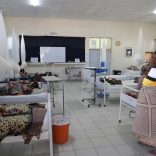Mozambique seeks US$4.1 billion to expand water access
Fruit and vegetables can be a source of contamination: What Maputo vendors have to say

Photo: O País
Fruit and vegetables are essential items in the diet of Mozambican families. Much of that bought in Maputo is grown in the Infulene valley, and from there taken to various markets in the capital and beyond.
Some growers sell their produce near the Infulene valley, right by the road, ignoring all the inherent dangers.
Vegetables seem to be washed with water of already dubious origin, which often looks like it should have been replaced long ago.
“We wash our vegetables in clean water and follow all hygiene precautions,” one of the vendors replied when challenged by ‘O País’.
Another saleswoman, Vanda Sérgio, says that she had certainly washed her vegetables, so as to protect her customers from possible infection.
“I always wash them, for sure, but today I didn’t bring it, because I forgot it at home,” the twenty-something saleswoman said. Some of her competitors, however, washed their vegetables with water from drainage ditches, she hinted, which may endanger the health of consumers.
Fruit also needs extra hygiene, especially in these times of pandemic.
“Yes,” fruit-seller Celine agrees, “the fruit comes in from South Africa, a country where we know many are infected with Covid-19. Fruit such as apples and grapes must be washed well.”
In the markets, people keep buying regardless, aware that food that is not going to be boiled must be subject to enhanced hygiene.
By Onélio Luís












Leave a Reply
Be the First to Comment!
You must be logged in to post a comment.
You must be logged in to post a comment.